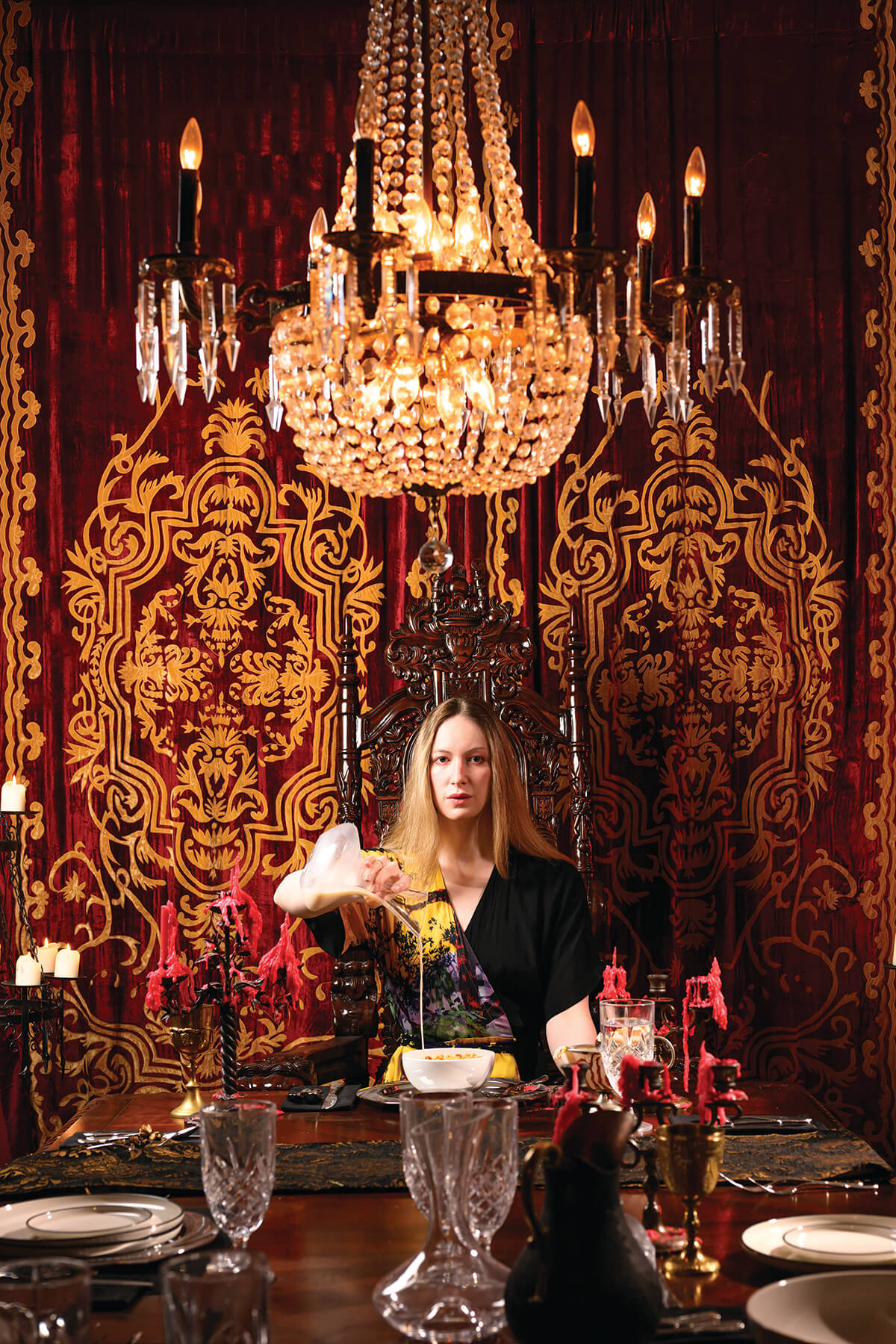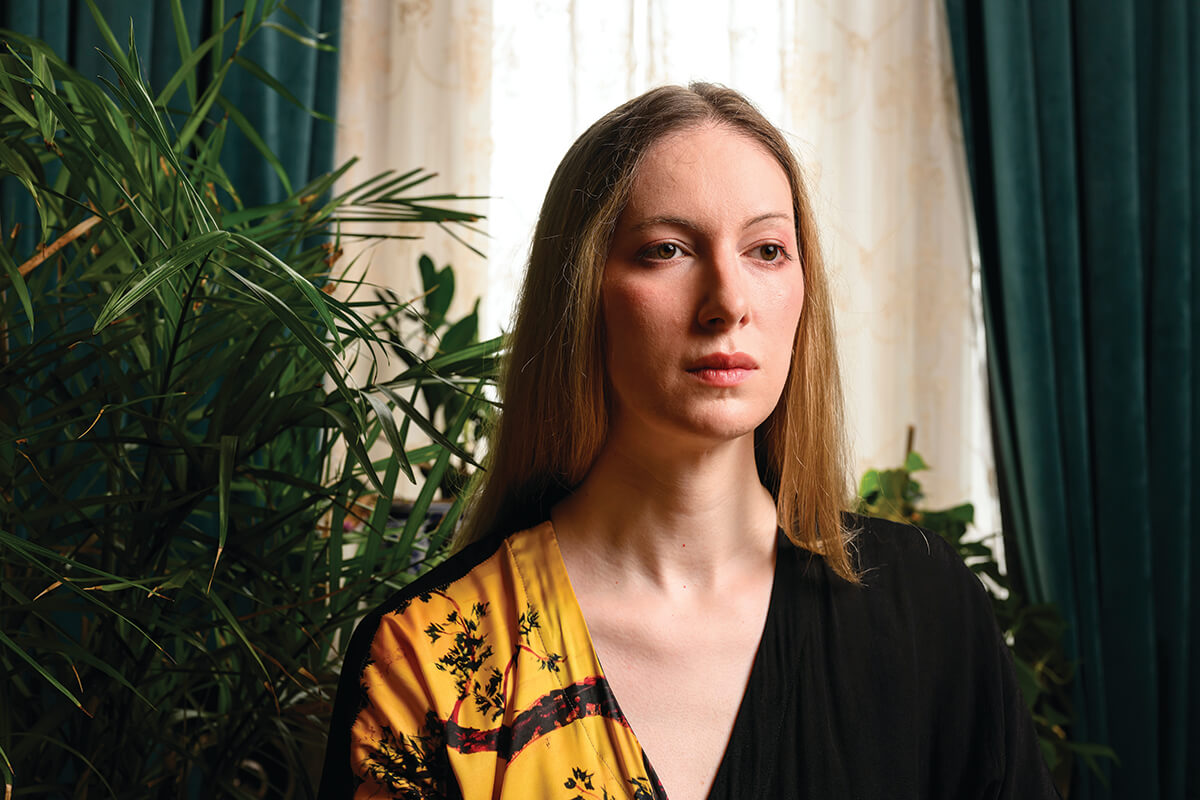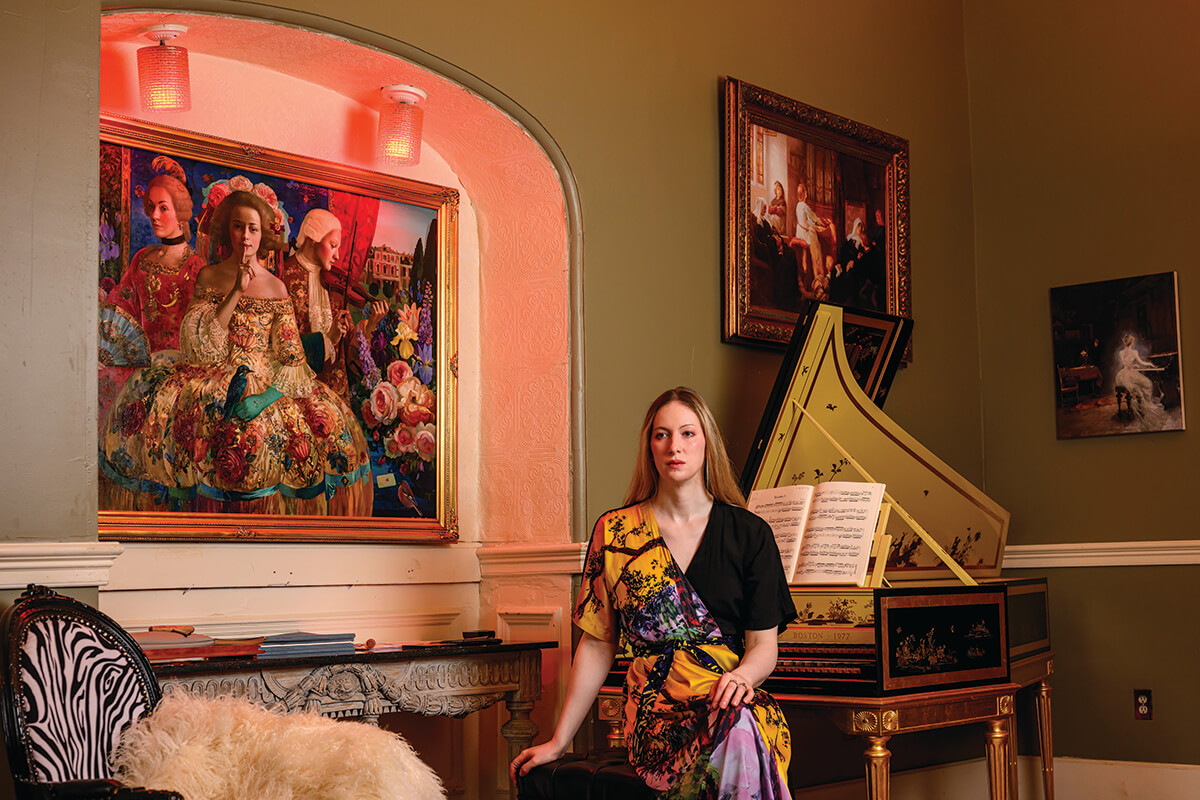Arts & Culture
Who Exactly Is Natalie Wynn?
The social media famous Baltimorean posts provocative, wildly entertaining YouTube videos that have earned her millions of fans—and her fair share of haters, too.

Natalie Wynn is quite possibly the most famous person you’ve never heard of. She’s what you would call social media famous. Gen Z and millennial famous. And certainly LGBTQ+ famous.
Her YouTube channel, where she posts under the moniker ContraPoints, has 1.79-million subscribers. She also has more than 30,000 paid Patreon subscribers, who get additional quick hit videos, called Tangents, made just for them. She has a Reddit account devoted to her, with breathless posts that follow her every move. “Let Mother Be Tired,” one was titled, when Wynn posted on X (formerly Twitter) that she was overworked.
“Does anyone know if there are any books that Natalie has recommended?” queries another. A third gushes about Wynn’s appearance in a recent video (“such a serve”).
She has fans. She has haters. She has articles written about her (there was a profile in The New Yorker, no less, that said she was “one of the few Internet demi-celebrities who is as clever as she thinks she is”). She’s been idolized. She’s been canceled. She’s been vilified. And she lives in Baltimore.
So who exactly is Natalie Wynn?
When I suggest to her that she’s a “Millennial Trans Fran Lebowitz,” she doesn’t object. “I do think Fran would be a Youtuber if she were my generation,” she says of the famed orator, known for her sharp wit and fearless candor.
I’m interviewing Wynn, 35, in her Baltimore City brownstone, a three-story home that looks like a cross between a Gilded- Age mansion and a Victorian brothel. She decorated it all herself, which will come as no surprise to those who have seen her videos, replete with elaborate backdrops—candles, books, tapestries, claw-foot tubs, and more—that she set-designs herself.
Today she’s dressed simply, in a T-shirt and artfully paint-splattered cardigan. She has long dark blonde hair. She’s tall and slender. Pretty, by almost every Western standard, but in a slightly quirky way, like all those knock-kneed girls Tyra Banks transformed into super models on America’s Next Top Model.

Her videos have a fairly wide range of topics, but they mostly focus on gender, transphobia, cancel culture, bigots, and narrow-mindedness in general. She’s not afraid to go after high-profile figures like Ben Shapiro, Jordan Peterson, and J.K. Rowling, backlash be damned.
One video from 2018 is called “Incels,” where she discusses the scourge of the “involuntary celibate” movement and talks to a skull, a la Hamlet. In another video, made in 2020, called “Shame,” she is nearly naked, Adam-and- Eve-style, with a crown of flowers and a dense, floral backdrop. Another recent video is about her unlikely love of the Twilight series. (She argues that female sexuality, even if it involves a hot teen vampire, should be celebrated, not kink-shamed.)
For that one, she’s sitting in her study, a dark, reddish-cast room—it happens to be the same one we’re sitting in now—illuminated by candles and the soft glow of tasseled vintage lamps. In the same room, there are also important-looking brown leather chairs; a carved chessboard; cluttered bookshelves, and, thrillingly, a ladder on wheels to reach the bookcase’s highest shelves.
The videos often have a classical music score, which tracks, as Wynn went to Berklee College of Music as an undergrad. (She plays piano and, more recently, the harpsichord. Downstairs in her brownstone, a semi-grand piano sits across from a beautifully ornate harpsichord, as though prepared for a round of dueling keyboards.)
She often does costume or even set changes, mid-video. She also has conversations with herself—playing both herself and a skeptical interrogator. She does voices, accents, characters. She interjects video clips and photos, often for comedic purposes. She wears hats (so many hats).
In a world of bare bones podcasts and boring Twitch streamers, Wynn puts on a show. Which is a good thing, because the videos can be up to three hours long. Yes, three hours of just Natalie Wynn talking. (TikTok is not the medium for her. She puts the “long” in long-form video.) But the talking is captivating—funny, erudite, provocative. She’s the coolest philosophy professor you never had.
Wynn grew up in Vienna, VA, with a medical doctor mother and an academic psychologist father (they’ve since divorced). She says her childhood wasn’t all that great.
“I mean, it’s not like I was working in the salt mines or anything,” she says. “But I wasn’t happy—there was lots of psychiatry involved.”
The gender exploration came later. She rues the fact that she didn’t grow up during our current gender revolution—it might’ve helped her figure things out more quickly. But mostly, she says, she was restless, anxious, and a little depressed.
She dropped out of Berklee and eventually landed at Georgetown, where her father worked. “I got a massive tuition benefit because, you know, nepotism,” she cracks. After graduation in 2012, she got a master’s degree in philosophy from Northwestern. The philosophy degree comes through often in her videos, where she routinely quotes Spinoza, Wittgenstein, and Socrates.
After Northwestern, she moved to Baltimore in 2015 because she was dating someone who lived here. It didn’t work out. “Once you switch your long-distance relationship to a short-distance relationship, the whole dynamic changes and it falls apart,” she says.
But she had fallen in love with Baltimore—it’s unpretentiousness, the beauty of its architecture, the history, its “weirdness,” the fact that “it feels like nature might reclaim the city at any moment,” she says. And she has joined the cult of RoFo—“a KFC inside a 7-Eleven,” she marvels. So she decided to stay.
At first, she was doing the gig economy thing. She gave piano lessons. She drove an Uber. She did some copywriting for Overstock.com. (“I remember this anger at having to write five paragraphs on a pillowcase,” she says.) It was around 2014 and something called GamerGate was going on—basically, a misogynistic harassment campaign directed at women who had the temerity to enter the previously male-centric world of gaming. In a way it was a precursor to a lot of the toxic things still happening in our culture—QAnon, the alt-right, doxxing.
That was when Wynn made her first YouTube video, about GamerGate. It didn’t do very well. But she kept making them and started gaining a following.
“I got viewers because I was making responses to bigger creators,” she explains.
She also got better at making the videos—and adopted the melodramatic, rococo style she has now become famous for.
IN A WORLD OF BARE BONES PODCASTS AND BORING TWITCH STREAMERS, WYNN PUTS ON A SHOW.
The follow-count grew and soon she was actually able to make a living at it. Ads weren’t going to be her ticket to success—YouTube monitors video content closely and Wynn was talking about some controversial topics. (She’s fairly sanguine about that fact: “If you’re, like, Squarespace or something, you’re not going to want to have your company advertising on a video about Nazis—even if your video is anti-Nazi.”) So she started a Patreon account, where fans could support her and get access to exclusive content.
All the while, she was gaining clarity about the fact that she was trans. In the videos, she began messing with gender, wearing wigs and makeup and dresses—even talking about her sexuality (she’s a lesbian). But she wasn’t quite ready to go out in public that way.
“Something about YouTube makes it easier to say things that you wouldn’t even say to your own family,” she explains. “Like, when you’re alone in your room, you can say things to a camera that would be hard to say to anyone else.”
She medically transitioned in 2017. I ask her if it was scary to do that in front of a camera. “Yes, it was, but in a way I didn’t fully understand how scary it was, which is good,” she says. “Otherwise, I might not have done it.”
And she freely admits that she became a little addicted to the online attention—the frisson of excitement she got when her view-count rose, the endorphin rush of receiving hundreds of comments (yes, she reads the comments). “It was exhilarating,” she says.
Until it wasn’t.

One of the reasons why Wynn talks a lot about cancel culture is because she was briefly canceled herself. It’s inevitable, in a way, when you’re that famous. With great success comes a great backlash. Yet it was a bit confusing at first.
“When you are someone who has gotten big online because people presumably want to know your thoughts on things and suddenly people are getting mad at you for doing just that, you’re like, ‘Why are you getting mad at me for saying my opinion? I’m a professional opinion-haver!’” she says.
It wasn’t just the right-wingers and centrists and J.K. Rowling fans who were gunning for her. She could handle that. It was members of her own tribe—the trans community, who thought Wynn was “failing her role as a spokesperson,” she says.
The worst came when Wynn made a video using a controversial trans activist named Buck Angel. (Ironically, Angel was enlisted to read a quote by John Waters.) To many in the trans community, Angel is something called a “transmedicalist,” meaning he thinks the only authentic trans people are the ones who have medically transitioned. By merely associating with him, Wynn herself was canceled by her own community. It was harsh. It was hurtful. And it made her paranoid.
“I can remember in 2019 literally walking around Baltimore with, like, a hoodie and sunglasses and earphones,” she says.
But it passed, as it always does. She’s learned a lot from it—basically that when the internet mob comes for you, the best thing to do is to say nothing or quickly apologize.
“Either way would be better than defending yourself, because you start posting a thread: ‘Part one of 26: Here’s why these people are wrong and why I’m right.’ The minute you start doing that, you’re beginning a spiral downwards into complete madness,” she says.
“…YOU CAN SAY THINGS TO A CAMERA THAT WOULD BE HARD TO SAY TO ANYONE ELSE…”
But it didn’t stop her from courting controversy, which brings us back to J.K. Rowling. Yes, that J.K. Rowling, billionaire authoress of the Harry Potter series. For some reason, Rowling has become obsessed with trans women. She’s someone who is disparagingly referred to as a TERF (trans-exclusionary radical feminist)—meaning she doesn’t think trans women should be in traditionally female spaces (bathrooms, locker rooms, female sports teams, etc.). Rowling has been vilified in some circles for her perspective—and cheered on in others—but she continues to double down on it.
Wynn has been one of her loudest detractors, which feels a bit like a loss to her.
“I loved Harry Potter—I used HTML to make a Harry Potter fan website when I was a kid! Harry Potter has a very widespread appeal, of course, but I think especially among people who are sort of bookish or like, quirky misfits. Because it’s such an escapist fantasy: You’re in this mundane world where you’re mistreated by your family and it actually turns out you’re really special, magical even. You get this letter and you go to this other world and another school where you’re a celebrity, and you’re the most important person in the world!”
She laughs and shakes her head. “So like a lot of her core audience is who she’s attacking here.”
Wynn was recently a guest on a hit podcast called “The Witch Trials of J.K. Rowling.” Wynn acquitted herself well—she was calm and articulate and persuasive. But she immediately regretted doing the podcast, which was mostly defending Rowling. She feared a backlash—so she got in front of it, taping a video about the podcast where she explained why she shouldn’t have done it. The video was nearly two hours long and got five million views.
“I actually think that I succeeded in damage-controlling it,” she says.
She’s getting better at this stuff. Negotiating potential backlash, ignoring the haters, recognizing that the internet is not real life.
Which is a good thing. Because she will never stop speaking her mind and speaking truth to power. Bigots, liars, and hypocrites, consider yourselves warned.